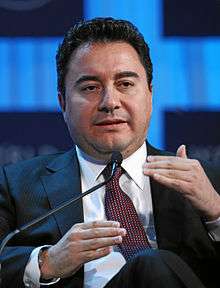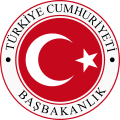Ali Babacan
| Ali Babacan MP | |
|---|---|
 | |
| Deputy Prime Minister of Turkey | |
|
In office 1 May 2009 – 28 August 2015 | |
| Prime Minister |
Recep Tayyip Erdoğan Ahmet Davutoğlu |
| Serving with |
Bülent Arınç Beşir Atalay Bekir Bozdağ Emrullah İşler Yalçın Akdoğan Numan Kurtulmuş |
| Preceded by | Nazım Ekren |
| Succeeded by | Cevdet Yılmaz |
| 41st Minister of Foreign Affairs | |
|
In office 29 August 2007 – 1 May 2009 | |
| Prime Minister | Recep Tayyip Erdoğan |
| Preceded by | Abdullah Gül |
| Succeeded by | Ahmet Davutoğlu |
| Chief Negotiator for Turkish Accession to the European Union | |
|
In office 17 January 2005 – 11 January 2009 | |
| Prime Minister | Recep Tayyip Erdoğan |
| Preceded by | Position established |
| Succeeded by | Egemen Bağış |
| Minister of Economic Affairs | |
|
In office 18 November 2002 – 29 August 2007 | |
| Prime Minister |
Abdullah Gül Recep Tayyip Erdoğan |
| Preceded by | Masum Türker |
| Succeeded by | Mehmet Şimşek |
| Member of the Grand National Assembly | |
|
Assumed office 1 November 2015 | |
| Constituency | Ankara (I) (Nov 2015) |
|
In office 19 November 2002 – 7 June 2015 | |
| Constituency | Ankara (I) (2002, 2007, 2011) |
| Personal details | |
| Born |
4 April 1967 Ankara, Turkey |
| Political party | Justice and Development Party |
| Spouse(s) | Ülkü Zeynep Babacan (1995–present) |
| Children |
Mustafa Kerem Fatma Dilara Hilmi Emir |
| Alma mater |
Middle East Technical University Northwestern University |
| Religion | Sunni Islam |
Ali Babacan (Turkish pronunciation: [aˈli babaˈdʒan]; born 4 April 1967 in Ankara, Turkey) is a Turkish politician. He is member of the parliament and former Deputy Prime Minister of Turkey responsible for the Economy. He fırst served as the Minister of State in charge of economic affairs in the 58th cabinet from the Justice and Development Party (AK Party). He retained this position throughout the 58th and 59th Governments of the Republic of Turkey. On August 29, 2007, he was appointed as the Minister of Foreign Affairs of the 60th Government of the Republic of Turkey.[1] During 2009-2015 he served as the Deputy Prime Minister for Economic and Financial Affairs of Turkey. He is married with three children.[2]
Education
Babacan graduated from Ankara College ranking first among the class of 1985.[3] He attended the Middle East Technical University in Ankara and in 1989 was awarded a BSc in Industrial Engineering with the highest marks.[3] He went to the U.S. on a Fulbright Scholarship to do postgraduate studies and in 1992 received an MBA from the Kellogg School of Management at Northwestern University in Evanston, Illinois, with majors in marketing, organizational behavior and international business.[3]
Career in finance
Babacan worked then for two years as an associate at QRM, Inc. in Chicago, Illinois, a company doing financial consulting to the top executives of major banks in the United States.[3] He returned to Turkey in 1994 and, served as chief advisor to the mayor of Ankara the same year. He was the chairman of his family owned textile company between 1994 and 2002.[4]
Political life
He entered politics in 2001 as a co-founder and a Board member of the Justice and Development Party [5] and was elected to parliament as deputy for Ankara on November 3, 2002. He was appointed Minister of Economy on November 18, 2002 and became the youngest member of the cabinet, then at the age of 35.[6]
Babacan had the duty to steer a painful economic reform program, which was backed by multi-billion-dollar IMF loans; with its help Turkish economy achieved a remarkable recovery after two severe crises. He stayed always away from the rough-and-tumble of the Turkish political arena and focused solely on the economic reform, acting rather as a technocrat without indulging into populism.
On May 24, 2005, Prime Minister Recep Tayyip Erdoğan announced his appointment as chief negotiator in Turkey's accession talks with the European Union,[7] which started on October 3, 2005.[8]
As government minister Babacan has attended several international meetings including the World Economic Forum in Davos, Switzerland, and the Bilderberg Group.
After some AK Party figures,[9] have been implicitly criticizing Babacan and implying that he is linked with Islamic scholar Fethullah Gülen [10] he wasn't appointed to any ministerial position in the last Cabinet.
References
- ↑ http://www.mfa.gov.tr/cv-of-minister-of-foreign-affairs-ali-babacan.en.mfa
- ↑ https://www.tbmm.gov.tr/develop/owa/milletvekillerimiz_sd.bilgi?p_donem=26&p_sicil=6063
- 1 2 3 4 "Başbakan ve bakanların özgeçmişleri" (in Turkish). Ntvmsnbc.com. 3 September 2007. Retrieved 13 January 2011.
- ↑ citation needed
- ↑ "Meclis'in 6. partisi" (in Turkish). Zaman.com.tr. 15 August 2001. Retrieved 13 January 2011.
- ↑ "58. Hükümet'in profili" (in Turkish). Ntvmsnbc.com. 18 November 2002. Retrieved 13 January 2011.
- ↑ "Başmüzakereci Ali Babacan" (in Turkish). Ntvmsnbc.com. 29 May 2005. Retrieved 13 January 2011.
- ↑ "Türkiye-AB müzakereleri resmen başladı" (in Turkish). Hurriyet.com.tr. 4 October 2005. Retrieved 13 January 2011.
- ↑ http://www.sozcu.com.tr/2014/gundem/yigit-buluttan-babacan-da-gulenci-aciklamasi-572487/
- ↑ http://www.hurriyetdailynews.com/deputy-pm-babacan-summons-economy-team-in-september-amid-questions-over-his-future.aspx?pageID=238&nID=70776&NewsCatID=344
External links
| Wikimedia Commons has media related to Ali Babacan. |
- Appearances on C-SPAN
- Ali Babacan on Charlie Rose
- Ali Babacan at the Internet Movie Database
- Biography at Biyografi.info
- Works by or about Ali Babacan in libraries (WorldCat catalog)
| Political offices | ||
|---|---|---|
| Preceded by Masum Türker |
Minister of Economic Affairs 2002–2007 |
Succeeded by Mehmet Şimşek |
| Preceded by Abdullah Gül |
Minister of Foreign Affairs 2007–2009 |
Succeeded by Ahmet Davutoğlu |
| Preceded by Nazım Ekren |
Second Deputy Prime Minister of Turkey 2007–2015 |
Succeeded by Cevdet Yılmaz |
